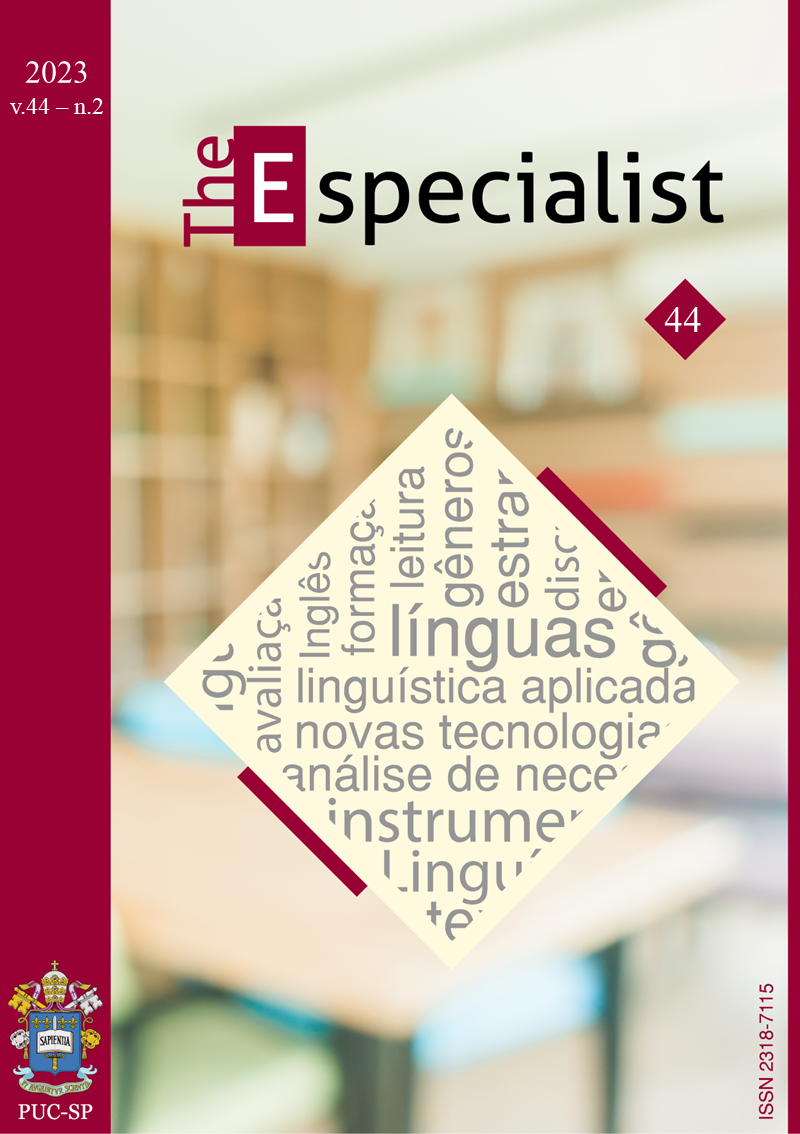Key multi-word terms in a language teacher education journal
uma análise de termos-chave em uma revista de formação de professores
Keywords:
language teacher education, teaching methodologies, key multi-word terms, Corpus LinguisticsAbstract
The Bem Legal Journal (BLJ) serves as a developmental platform for pre- and in-service teachers (Welp et al., 2020) to shape their identity as teacher-author-educators while improving language education (Garcez & Schlatter, 2017). This article aims to expand upon the work of Welp et al. (2020) by identifying the topics covered in BLJ articles through the extraction of key multi-word terms (KMWT), a type of keyword that consists of two or more words and appears more frequently in the corpus of study when contrasted to a reference corpus (Kilgarriff et al., 2014). The corpus of study comprises all English-written BLJ articles, while The Warwick ELT Journal serves as the reference corpus. The "Keyword & Term" tool in Sketch Engine (Kilgarriff et al., 2014) was used to extract KMWT and the "Concordance" tool aided in understanding their meanings in the corpus of study. The analysis of the 95 KMWT extracted revealed seven categories with project-based pedagogy emerging as the preferred teaching methodology. This study sheds light on the topics and teaching approaches covered in BLJ and may offer valuable insights for language educators seeking to enhance their professional development.
References
BAKHTIN, M. 1986. The Problem of Speech Genres. In: BAKHTIN, M. Speech Genres and Other Late Essays. Trad. Vern W. McGee. Austin: University of Texas Press. pp. 60-102.
BARBOSA, M.C.S. 2004. Por que voltamos a falar e a trabalhar com a Pedagogia de Projetos. Projeto – Revista de Educação, 3.4: 8-13. Porto Alegre.
BENNETT, G.R. 2010. Using Corpora in the Language Learning Classroom: Corpus Linguistics for Teachers. Ann Arbor: University of Michigan Press.
BONDI, M. 2010. Perspectives on keywords and keyness. In: BONDI, M.; SCOTT, M. (Eds.), 2010, Keyness in Texts. Amsterdam: John Benjamins Publishing Company. pp. 1-18.
BRANDEN, K.V.D. 2006. Introduction: Task-based language teaching in a nutshell. In: BRANDEN, K.V.D. (Ed.). Task-Based Language Education: From theory to practice. Cambridge: Cambridge University Press. pp. 1-16.
BRANDEN, K.V.D. 2016. Task-based language teaching. In: HALL, Graham. (Ed.), 2016, The Routledge Handbook of English Language Teaching. Oxon: Routledge. pp. 238-251.
BREZINA, V. 2018. Statistics in Corpus Linguistics. Cambridge: Cambridge University Press.
GARCEZ, P.M.; SCHLATTER, M. 2017. Professores-autores-formadores: Princípios e experiências para a formação de profissionais de educação linguística. In: MATEUS, E.; TONELLI, J.R.A. (Eds.), 2017, Diálogos (im)pertinentes entre formação de professores e aprendizagem de línguas. São Paulo: Blucher. pp. 13-36.
GIBBONS, P. 2015. Scaffolding language, scaffolding learning: teaching second language learners in the mids-tream classroom. Portsmouth: Heinemann. 2nd. ed.
HALL, G. 2015. Method, methods and methodology: Historical trends and current debates. In: HALL, G. (Ed.), 2016, The Routledge Handbook of English Language Teaching. Oxon: Routledge. pp. 209-223.
KILGARRIFF, A.; BAISA, V.; BUŠTA, J.; JAKUBÍČEK, M.; KOVÁŘ, V.; MICHELFEIT, J.; RYCHLÝ, P.; SUCHOMEL, V. 2014. The Sketch Engine: ten years on. Lexicography, 1.1: 7-36.
MCENERY, T.; HARDIE, A. 2012. Corpus Linguistics: Method, Theory and Practice. Cambridge: Cambridge University Press.
ROSCH, E. Principles of Categorization. 1978. In: AARS, B.; DENILSON, D.; KEIZER, E.; POPOVA, G. (Eds.), 2004, Fuzzy Grammar: A Reader. Oxford: Oxford University Press. pp. 91-108.
SCHLATTER, M.; GARCEZ, P.M. 2009. Línguas Adicionais (Espanhol e Inglês). In: RIO GRANDE DO SUL, Secretaria de Estado da Educação, Departamento Pedagógico, 2009, Referenciais Curriculares do Rio Grande do Sul: Linguagens, Códigos e suas Tecnologias. Vol. 1. Porto Alegre: Secretaria de Estado da Educação/Departamento Pedagógico. pp. 127-172.
SCHLATTER, M.; GARCEZ, P.M. 2012. Línguas Adicionais na Escola: Aprendizagens Colaborativas em Inglês. Porto Alegre: Edelbra.
SCOTT, M. 1997. PC analysis of keywords - and key key words. System, 25.2: 233-245.
SCRIVENER, J. 2011. Learning Teaching: The Essential Guide to English Language Teaching. Oxford: Macmillan. 3rd. ed.
VYGOTSKY, L.S. 1998. A Formação Social da Mente. São Paulo, Martins Fontes.
WELP; A.K.S.; SARMENTO, S.; SELBACH, H.V.; RAMOS, D.S. 2020. Good Practices in Language Education: the contributions of Bem Legal Journal to Language Teacher Education. Brazilian English Language Teaching Journal, 11.1: 1-9. Porto Alegre.
Published
How to Cite
Issue
Section
License
Copyright (c) 2023 The ESPecialist

This work is licensed under a Creative Commons Attribution 4.0 International License.
The authors grant the journal all copyrights relating to the published works. The concepts issued in signed articles are the absolute and exclusive responsibility of their authors.


 Esta obra está licenciada com uma Licença
Esta obra está licenciada com uma Licença 